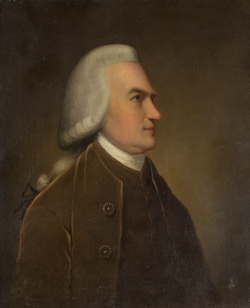The Captain Who Hosted Gen. Washington in Boston
In looking for clues about the ship captain who told Gen. George Washington that the British military was preparing to leave in March 1776, I came across this line in an 18 March letter from Thomas Cushing to Robert Treat Paine:
Did Washington choose to dine inside liberated Boston with the mariner who had first told him the British were preparing to leave?
It appears not.
Rather, the consensus is that Washington’s host was the Boston merchant captain and erstwhile Council member John Erving, Sr. However, as the editors of the R. T. Paine Papers commented:
Bowdoin was a senior member of the Massachusetts Council who had met several times with Gen. Washington in the preceding months. On good days he was the senior figure in the Massachusetts government. And John Erving, Sr., was his father-in-law.
Bowdoin couldn’t host Washington at his own house since he didn’t know what shape it was in after British occupation. But old Capt. Erving had stayed in Boston through the siege and could still host a genteel dinner.
True, most Erving men had shown themselves to be Loyalist, but perhaps that was all the more reason to reward a well-connected patriarch who had decided to remain in town as the British left.
A Detachment of our Troops have gone into Boston and this Day General Washington & his Suit dined with Captain Erving.Was that the same captain as the Erving, Irvine, Irwin, Erwin, or Ervin who provided the general with useful information about two weeks before?
Did Washington choose to dine inside liberated Boston with the mariner who had first told him the British were preparing to leave?
It appears not.
Rather, the consensus is that Washington’s host was the Boston merchant captain and erstwhile Council member John Erving, Sr. However, as the editors of the R. T. Paine Papers commented:
John Erving (c. 1692–1786), a wealthy Boston merchant originally from the Orkneys, was an odd choice as Washington’s first dinner host. A member of the Council for some twenty years, Erving declined the offer of a seat on General [Thomas] Gage’s Mandamus Council, but his sons John and George accepted. All three of his surviving sons became Loyalists, and at least one of had just left Boston with the British troops.I think the answer to that minor mystery goes back to James Bowdoin (shown above), the same man whose anecdote about Gen. William Howe sent me looking for Washington’s late informants in the first place.
Bowdoin was a senior member of the Massachusetts Council who had met several times with Gen. Washington in the preceding months. On good days he was the senior figure in the Massachusetts government. And John Erving, Sr., was his father-in-law.
Bowdoin couldn’t host Washington at his own house since he didn’t know what shape it was in after British occupation. But old Capt. Erving had stayed in Boston through the siege and could still host a genteel dinner.
True, most Erving men had shown themselves to be Loyalist, but perhaps that was all the more reason to reward a well-connected patriarch who had decided to remain in town as the British left.


No comments:
Post a Comment